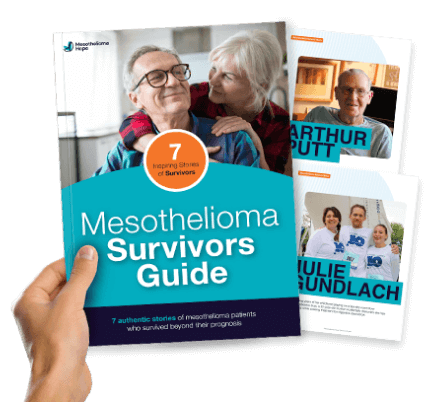Can Mesothelioma Go Into Remission?
Yes, many cases of mesothelioma have gone into remission. Remission is achieved when tumors are at least 50% smaller than they were before treatment.
Patients with malignant mesothelioma can reach remission when they show no visible signs of cancer, also known as No Evidence of Disease (NED). There are some cases in which patients have had NED for 20 years or longer.
The odds of achieving mesothelioma remission are higher if the cancer is caught before it can spread to other areas of the body. At this point, it’s easier to remove or shrink tumors with surgery, chemotherapy, and other treatments.
Get our Free Mesothelioma Guide to learn about treatments that can help you or a loved one achieve remission.
What’s the Difference Between Remission & Recurrence?
Remission and recurrence are terms that mesothelioma doctors use to describe the current state of disease in a patient. Here’s a breakdown of the differences between the two.
Mesothelioma Remission
Remission refers to a period during which the signs and symptoms of mesothelioma get better or disappear.
There are two types of mesothelioma remission:
- Partial remission occurs when the cancer shrinks but doesn’t completely disappear. Some mesothelioma symptoms may improve, and the size of the tumors decreases by at least half.
- Complete remission happens when all signs of mesothelioma are gone, and tests show no evidence of the disease. However, this does not necessarily mean the cancer is cured, as it can still be present in the body at undetectable levels.
There is also stable disease, which occurs when the cancer has not decreased in size but also hasn’t grown or spread. The disease is under control, and symptoms may remain the same without worsening.
Mesothelioma Recurrence
Mesothelioma recurrence is when signs of cancer return after a period of remission. This can happen because cancer cells that were undetectable during remission begin to grow again.
There are three types of mesothelioma recurrence:
- Local recurrence is when the cancer returns in the same location where it originally developed.
- Regional recurrence happens when the cancer reappears in nearby organs or tissues.
- Distant recurrence is when the cancer reappears in a completely different part of the body, such as the lungs, liver, or lymph nodes.
If you’re in remission, you should attend regular follow-up appointments and watch for any symptoms of mesothelioma recurrence. This can help treat a cancer recurrence early if it does happen.

“You have options — even if you feel like you don’t. While there may be limited FDA-approved treatment options for mesothelioma recurrence, now would be the time to seek out a clinical trial and schedule consultations with top mesothelioma researchers.”
Treatments That Can Promote Remission
Mesothelioma treatment provides your best chance to achieve remission. Your ability to enter mesothelioma remission depends on how your cancer responds to treatment.
Learn more about the different treatment options for mesothelioma below.
Surgery
Mesothelioma surgery allows doctors to remove visible cancer tumors from the body.
Cancer patients diagnosed with stage 1 or stage 2 mesothelioma are often eligible for life-extending surgical procedures that could possibly lead to remission. In these early stages, the cancer hasn’t spread very far and mesothelioma tumors are easier to remove.
Some common mesothelioma surgeries include:
- Cytoreduction with HIPEC, where the cancerous lining of the abdomen is removed and a heated chemotherapy solution is applied to kill any remaining cancer cells.
- Extrapleural pneumonectomy (EPP), where a surgeon removes all visible tumors by extracting the cancerous lung and any nearby tissue.
- Pleurectomy with decortication (P/D), which removes the cancerous lung lining and any mesothelioma tumors on the surface of the lung.
Use our Free Doctor Match to get help accessing cancer treatments that have helped other patients become long-term survivors.
Additional Treatments
While surgery alone can help some patients achieve mesothelioma remission, most specialists combine it with at least one other type of treatment for the best possible outcome.
This is known as multimodal therapy, and it’s been found to improve mesothelioma survival and quality of life.
Additional treatments used to achieve mesothelioma remission include:
- Chemotherapy: This treatment uses powerful drugs to target and kill cancer cells. It’s often used after surgery to destroy any remaining cancer. Chemotherapy is typically given in cycles to allow the body to recover between treatments.
- Immunotherapy: This innovative treatment helps the immune system recognize and fight mesothelioma cells more effectively, which can allow patients to achieve and maintain remission.
- Radiation therapy: This treatment uses high-energy radiation to target and destroy cancer cells. Radiation therapy can be used before surgery to shrink tumors so they’re easier to remove, or after surgery to kill any remaining cancer cells.
One patient with advanced peritoneal mesothelioma achieved full remission after multiple rounds of chemotherapy, according to a 2023 article in BMJ Case Reports.
Clinical Trials
Researchers nationwide are conducting clinical trials for new mesothelioma treatments that can improve mesothelioma remission rates.
In some cases, mesothelioma patients whose cancer didn’t respond to traditional treatments achieved remission after getting a newer treatment in a clinical trial.
Our Patient Advocates can help you access treatments that could promote mesothelioma remission. Contact us today to get started.
Survivors Who Have Achieved Mesothelioma Remission
Many mesothelioma survivors have achieved long-term remission and far outlived their life expectancies.

John, 13+ year survivor
EPP surgery helped John achieve long-term mesothelioma remission for nearly 7 years. He had a recurrence in 2019 but is still alive today.

Mary Jane, 15-year survivor
Mary Jane was cancer-free for 14 years after chemotherapy and cytoreductive surgery. She passed away from Alzheimer’s complications in 2018.

Mike, 9-year survivor
Mike had an extended period of remission thanks to chemotherapy and EPP surgery. Sadly, he lost his cancer battle in 2020.
The hope is that more mesothelioma patients will be able to enter remission as treatment continues to improve and new therapies are tested in clinical trials.
Get our Free Survivors Guide to read the stories of 7 patients who beat the odds and are still thriving 15+ years after their mesothelioma diagnosis.
How to Improve Your Chances of Remission
Acting quickly after a mesothelioma diagnosis can help your body fight cancer and work toward remission. Find out how you can boost your chances of mesothelioma remission below.
See a Mesothelioma Specialist
Because this cancer is so rare, it’s important to see a specialist who has experience diagnosing and treating patients with mesothelioma.
Getting treatment from a mesothelioma specialist can improve your life expectancy and give you a better chance of achieving remission.

“I can’t stress it enough, but seeing a surgeon and a medical oncologist who can manage this disease is so important. We can offer things that maybe somebody in the community can’t.”
Explore Emerging Therapies
Targeted therapy and other emerging treatments can help reduce the size of mesothelioma tumors, alleviate symptoms, and even put your cancer into remission.
A study conducted by MD Anderson Cancer Center found that 40% of peritoneal mesothelioma patients achieved partial or complete remission after being treated with the two targeted therapy drugs atezolizumab (Tecentriq®) and bevacizumab (Avastin®).
Stay in Good Health
Maintaining a healthy lifestyle can improve your chances of mesothelioma remission.
Here are 3 tips to incorporate into your daily routine:
- Avoid smoking: Not smoking is crucial. It reduces your risk of complications and supports your body’s ability to heal and fight cancer.
- Incorporate exercise: If cleared by your doctor, start an exercise plan. Physical activity can ease pain, stiffness, fatigue, and other side effects of treatment. Even gentle exercises like walking or yoga can help you sleep better and feel less stressed.
- Maintain a balanced diet: Proper diet and nutrition can strengthen your immune system, boost your energy levels, and improve your overall well-being.
Get Help Achieving Mesothelioma Remission
While mesothelioma is an aggressive disease, there are concrete steps you can take to improve your life expectancy and potentially achieve remission. Mesothelioma Hope is here to guide you every step of the way.
Our team of Patient Advocates can:
- Connect you with top mesothelioma specialists
- Help you find the best clinical trials
- Provide information on the latest treatment options
- Share support resources with you and your family
Call us at (866) 608-8933 or use our Free Doctor Match to connect with specialists who offer life-extending treatments.
Mesothelioma Remission and Recurrence FAQs
Does mesothelioma go into remission?
Yes, mesothelioma can go into remission. Remission means that the signs and symptoms of cancer improve or disappear.
Achieving mesothelioma remission often involves a combination of treatments such as surgery, chemotherapy, immunotherapy, and radiation therapy.
Various factors can impact your ability to achieve remission, including the stage of mesothelioma, your overall health, and how your cancer responds to treatment.
What happens when mesothelioma comes back?
When mesothelioma cancer comes back, it is known as a recurrence.
Mesothelioma recurrence can happen at the original tumor site (local recurrence), nearby tissues (regional recurrence), or distant parts of the body (distant recurrence).
If your mesothelioma comes back, it may be possible to enter remission again with treatment from a specialist.
Has anyone ever recovered from mesothelioma?
Yes. Some patients have responded exceptionally well to treatment, leading to extended periods of mesothelioma remission and an improved quality of life.
Support from loved ones and a positive mindset also play crucial roles in the recovery process. While mesothelioma is a serious illness, ongoing research and new treatment options continue to offer hope for complete recovery.
What can I expect from mesothelioma remission?
If your mesothelioma goes into remission, it means that the cancer has either reduced or disappeared. Chest pain, shortness of breath, and other symptoms of mesothelioma may improve or go away completely.
During remission, it’s important to maintain a healthy lifestyle and avoid known risk factors such as smoking.
Your emotional well-being is also crucial — staying connected with family, friends, and support groups can provide hope and a sense of community.










